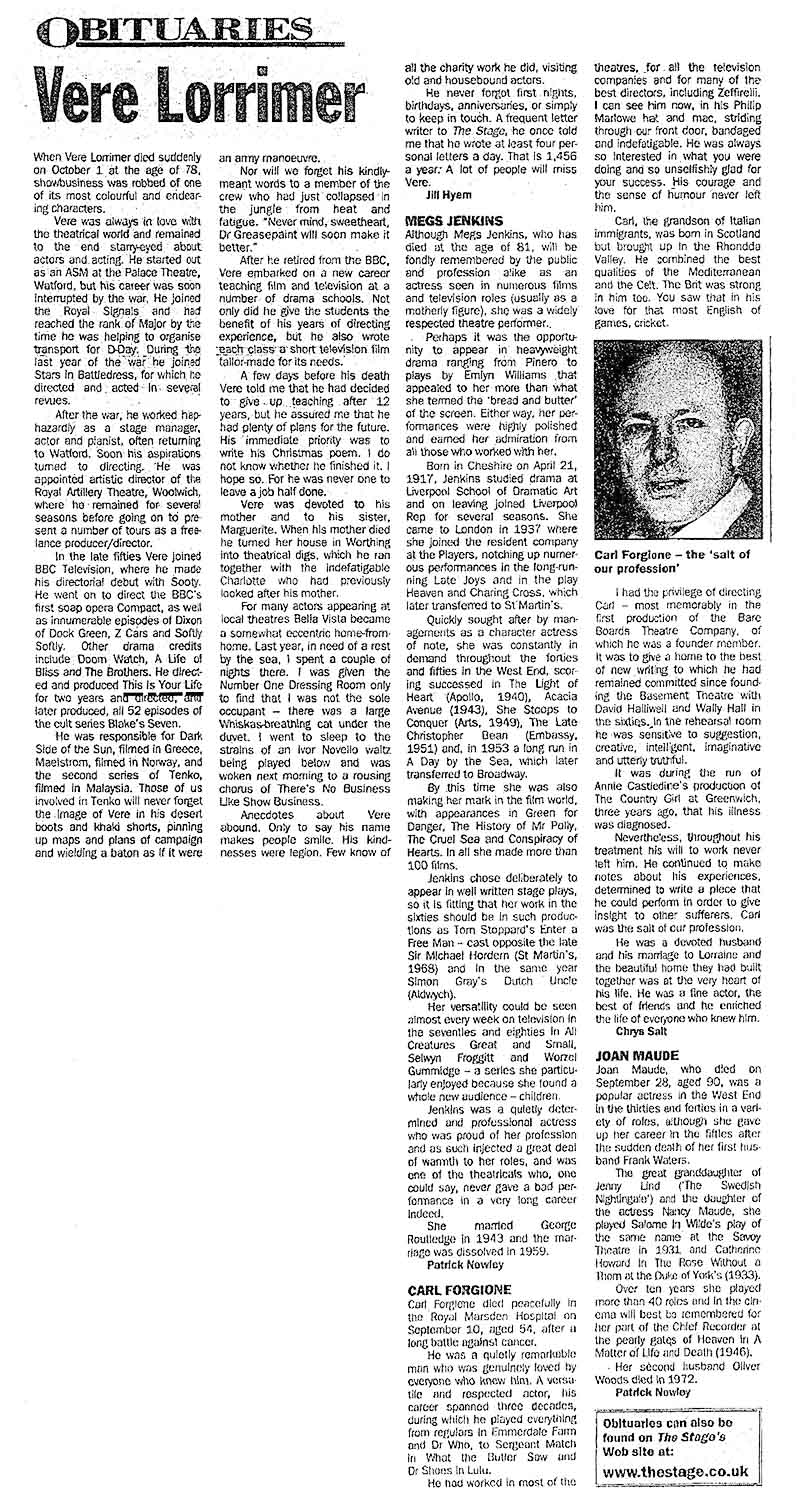Big Red Book
Celebrating television's This Is Your Life
15 October 1998

the producers who steered the programme's success
OBITUARIES
by Jill Hyam
When Vere Lorrimer died suddenly on October 1 at the age of 78, showbusiness was robbed of one of its most colourful and endearing characters.
Vere was always in love with the theatrical world and remained starry-eyed about actors and acting. He started out as a ASM at the Palace Theatre, Watford, but his career was soon interrupted by the war. He joined the Royal Signals and had reached the rank of Major by the time he was helping to organise transport for D-Day. During the last year of the war he joined Stars in Battledress, for which he directed and acted in several revues.
After the war, he worked haphazardly as a stage manager, actor and pianist, often returning to Watford. Soon his aspirations turned to directing. He was appointed artistic director of the Royal Artillery Theatre, Woolwich, where he remained for several seasons before going on to present a number of tours as a freelance producer/director.
In the late fifties Vere joined BBC Television, where he made his directorial debut with Sooty. He went on to direct the BBC's first soap opera Compact, as well as innumerable episodes of Dixon of Dock Green, Z Cars and Softly, Softly. Other drama credits include Doom Watch, A Life of Bliss and The Brothers. He directed and produced This Is Your Life for two years and directed, and later produced, all 52 episodes of the cult series Blake's Seven.
He was responsible for Dark Side of the Sun, filmed in Greece, Maelstrom, filmed in Norway, and the second series of Tenko, filmed in Malaysia. Those of us involved in Tenko will never forget the image of Vere in his desert boots and khaki shorts, pinning up maps and plans of campaign and wielding a baton as if it were an army manoeuvre.
Nor will we forget his kindly-meant words to a member of the crew who had just collapsed in the jungle from heat and fatigue, "Never mind, sweetheart, Dr Greasepaint will soon make it better."
After he retired from the BBC, Vere embarked on a new career teaching film and television at a number of drama schools. Not only did he give the students the benefit of his years of directing experience, but he also wrote each class a short television film tailor made for its needs.
A few days before his death Vere told me that he had decided to give up teaching after 12 years, but he assured me that he had plenty of plans for the future. His immediate priority was to write his Christmas poem. I do not know whether he finished it. I hope so. For he was never one to leave a job half done.
Vere was devoted to his mother and to his sister, Marguerite. When his mother died he turned her house in Worthing into theatrical digs, which he ran together with the indefatigable Charlotte who had previously looked after his mother.
For many actors appearing at local theatres Bella Vista became a somewhat eccentric home-from-home. Last year, in need of a rest by the sea, I spent a couple of nights there. I was given the Number One Dressing Room only to find that I was not the sole occupant – there was a large Whiskas-breathing cat under the duvet. I went to sleep to the strains of an Ivor Novello waltz being played below and was woken next morning to a rousing chorus of There's No Business Like Show Business.
Anecdotes about Vere abound. Only to say his name makes people smile. His kindnesses were legion. Few know of all the charity work he did, visiting old and housebound actors.
He never forgot first nights, birthdays, anniversaries or simply to keep in touch. A frequent letter writer to The Stage, he once told me that he wrote at least four personal letters a day. That is 1456 a year. A lot of people will miss Vere.